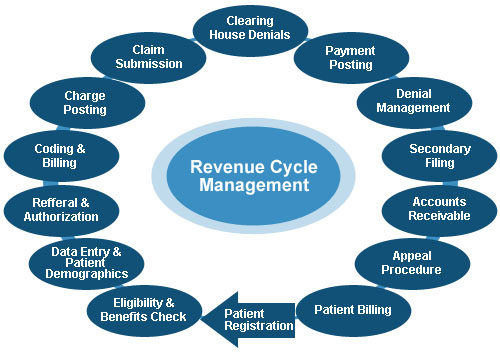WHAT IS RCM?
- Revenue cycle management (RCM) is the financial process, utilizing medical billing software, that healthcare facilities use to track patient care episodes from registration and appointment scheduling to the final payment of a balance.
- RCM begins when a patient schedules an appointment and it ends when the healthcare provider has accepted all payments. Errors in Revenue Cycle Management can lead to the healthcare provider receiving delayed payments or no payment at all. Because the revenue cycle process is complex and subject to regulatory oversight, healthcare providers can turn over their Revenue Cycle Management to companies that handle this complex process 24/7 with specialized agents and propriety technologies to manage healthcare provider revenue cycles.
REVENUE CYCLE MANAGEMENT

WHAT IS HIPAA?
- Health Insurance Portability and Accountability Act of 1996 is United States legislation that provides data privacy and security privisions of safeguarding medical information.
- The HIPAA legislation has four primary objectives: Assure health insurance portability by eliminating job-lock due to pre-existing medical conditions. Reduce healthcare fraud and abuse. Enforce standards for health information.
- Sets the standard for protecting sensitive patient data. Any company that deals with protected health information (PHI) must ensure that all required physical, network, and process security measures are in place and followed.
PHI VERSUS HEALTH DATA
In order for health data to be considered PHI and regulated by HIPAA it needs to be two things:
- Personally identifiable to the patient
- Used or disclosed to a coverage entity during the course of care
Examples of PHI:
- Billing information from your doctor
- Email to your doctor’s office about a medication or prescription you need.
- Appointment scheduling note with your doctor’s office
- An MRI scan
- Blood test results
- Phone records
Examples of health data that is not considered PHI:
- Number of steps in a pedometer
- Number of calories burned
- Blood sugar readings w/out personally identifiable user information (PII) (such as an account or user name)
- Heart rate readings w/out PII
YOU SHOULD NOW BE ABLE TO:
- Define federal and commercial healthcare policies in the US.
- Discuss the different insurance processes.
- Define Revenue Cycle Management and its importance to medical billing.
- Enumerate the different phases of RCM.
- Give different scenarios complying to or violating HIPAA.
Pages: 1 2